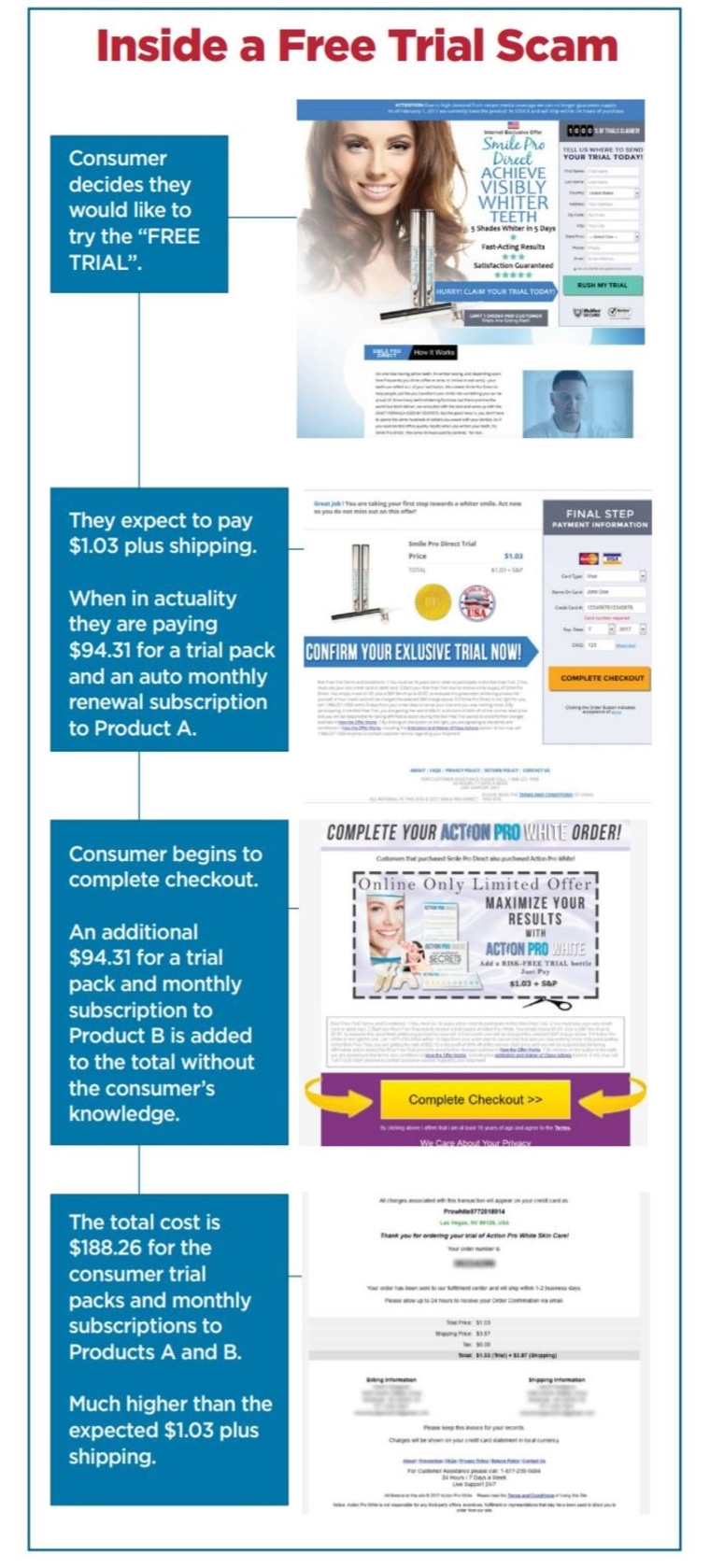You’ve probably heard or seen the ads pitching “miracle” products that promise to burn away the fat, erase those ugly wrinkles or whiten your teeth.
In many cases, these ads (which are all over the internet) offer a “risk-free” trial that works something like this: Try a free bottle of our revolutionary supplement. All you pay is $4.95 for shipping and handling. If you’re not completely satisfied, just cancel and there’s nothing more to pay.
“Many of these risk-free trial offers are not free,” the Better Business Bureau warns in a new report. In many cases, there are strings attached, so you could wind up being charged for products you don’t want and didn’t order.
That’s why the Bureau urges consumers to use “extreme caution” before agreeing to a risk-free trial offer which requires you to provide the company with a credit or debit card number to pay for shipping/handling charges.
Warning: Consumer experts advise against using a debit card to pay for online or phone purchases with unknown companies. If there is a problem, credit cards provide much greater fraud protection.
The BBB report explains how bogus free trial offers typically hide important terms and conditions (especially hard to spot when ordering on a mobile device):
- You’ve agreed to buy that product unless you cancel (and there isn’t much time to do that). If you can find the fine print often hidden on the website, you’ll discover that you may have a very short time — often only 14 days — to receive the product, evaluate it, cancel the order and return the product to avoid being charged $100 or more. Even if you act quickly, cancelling the order is often difficult or impossible to do. Some victims complain that the grace period had already expired before the package arrived.
- You signed up for an ongoing subscription. The fine print may also state that by accepting the free trial offer, you’ve agreed to sign up for ongoing monthly shipments of this product or others. These will be charged to the credit or debit card you provided to cover the initial shipping/handling fee.

A SERIOUS AND GROWING PROBLEM
The BBB investigation into fake free trial offers highlights a serious and growing problem. Among the key findings:
- The BBB received nearly 37,000 complaints about free trial offers during the last three years.
- Not every complaint involved a monetary loss, but for those that did, the average loss was $186.
- Complaints to the Federal Trade Commission about these offers more than doubled between 2015 and 2017. Victims involved in 14 free trial offer cases resolved by the FTC during the last 10 years lost more than $1.3 billion.
“Fraudsters have created a global multi-billion-dollar industry that has ripped off millions of people based on false and deceptive advertising related to fake risk-free trial offers,” said BBB International Investigations Specialist Steve Baker, who prepared the report.
WHY ARE BOGUS FREE TRIAL OFFERS SO SUCCESSFUL?
Scammers offer free trials for the same reason reputable companies do — they get a response, especially for a new product or one that is not well known.
If the pills, powder or lotion doesn’t work as claimed, you can tell yourself, you paid next to nothing for it.
Kit Yarrow, a consumer psychologist and author of "Decoding the New Consumer Mind", says risk-free offers allow people to override their “too-good-to-be-true” instincts.
“Deep down consumers know that most of the gimmicky weight loss, get-rich-quick, hair regrowth and wrinkle busting products don’t work,” Yarrow told NBC News BETTER. “But they want them to work, they want to believe, and so a risk-free guarantee gives them just enough ‘proof’ to rationalize the purchase.”
Dishonest companies have another way to break down your defenses. Their free-trial-offer ads frequently include bogus endorsements from celebrities who supposedly use and love the products being sold.
“These claims are total lies,” the BBB’s Baker told NBC News BETTER. “Celebrities like Tim Allen, Sally Field, Joy Behar, Whoopi Goldberg and Judge Judy have no relationship with these types of companies and their names and pictures are used without their permission.”
AVOID THE SCAMS
There are ways to reduce your chances of being stung by a deceptive free trial offer. The Federal Trade Commission advises:
- Research the company online: See what other people are saying. Are they complaining about the company’s products, service or free trial offers?
- Know what you’re agreeing to: Regardless of where you see or hear the ad, find and read the terms and conditions. If you can't find them or don’t understand exactly what you're agreeing to, don't sign up.
- If you sign up online, look for pre-checked boxes: That checkmark may give the company the green light to continue the offer past the free trial period or sign you up for more products — only this time you have to pay.
- Mark your calendar: Your free trial probably has a time limit and once it passes, if you haven’t cancelled your “order,” you may be on the hook to buy that product or make future purchases.
By regularly checking your credit and debit card statements, you can quickly spot an unauthorized charge. Should that happen, contact the company directly, if possible. If that doesn’t work, call your credit card company, dispute the charge and ask for the charge to be reversed. With an erroneous charge on your debit card, contact the bank or credit union and ask them to investigate.
You should also complain to the Better Business Bureau and the Federal Trade Commission.
My advice: Before you throw caution to the wind and sign up for a little sample of an unknown product that promises “miraculous results” from a company you’ve never heard of before, ask yourself: Do I really want to give them my credit or debit card number? Is it really worth the potential hassle, if this is a fake offer? I think you know the answer.
Next: Want to save more money in 2019? These are the tools you need to succeed
Want more tips like these? NBC News BETTER is obsessed with finding easier, healthier and smarter ways to live. Sign up for our newsletter and follow us on Facebook, Twitter and Instagram.


